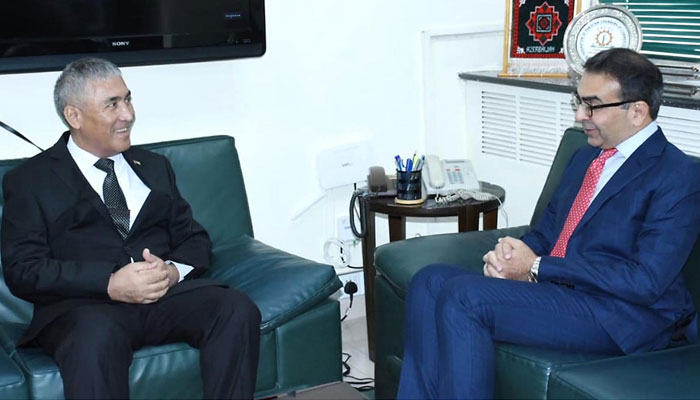$10bn TAPI project: Law ministry’s opinion sought after Turkmenistan’s demand
Turkmenistan will be having 85 percent shares in the project while Afghanistan, Pakistan and India would each have 5 percent shares of $200 million
ISLAMABAD: The fate of Turkmenistan’s demand seeking legislative cover of Foreign Investment Promotion and Protection Act (FIPPA), 2022 for its investment to be made in Pakistan’s territory, under the trans-nation $10 billion TAPI gas pipeline project, depends upon the legal opinion from the Law Division.
The gas pipeline from Turkmenistan has to pass through Afghanistan, Pakistan and India. Turkmenistan will be having 85 percent shares in the project while Afghanistan, Pakistan and India would each have 5 percent shares of $200 million.
“The Petroleum Division has sought the opinion from the Law Division and waiting its response on Turkmenistan’s demand and then it will be in a position to firm up its recommendations to be submitted in Special Investment Facilitation Council,” a senior official of the Energy Ministry told The News.
“Earlier, the demand from Turkmenistan was raised in the SIFC, which decided to seek inputs from all the stakeholders and formulate recommendations for the apex committee of SIFC.”
The government in 2022 extended the special treatment to protect foreign investment in the Reko Diq project for which it approved the Foreign Investment Promotion and Protection Act (FIPPA), 2022, through the parliament to provide a legal cover for the Reko Diq project, a copper and gold mine in Balochistan province being developed by a consortium of foreign companies.
The official said the legislative cover that was extended to foreign investment in the Reko Diq case is a special treatment which cannot be extended to every investor. “If Afghanistan and India, which are also part of the TAPI gasline project, extend the same legislative cover to Turkmenistan investment in the pipeline, then Pakistan may have no objections.”
Pakistan has already assured the protection of Turkmen investment with a sovereign guarantee under the Host Government Agreement (HGA).
The official said that the FIPPA, 2022, may help Turkmenistan increase the credibility of Turkmen gas companies before banks for bankable feasibility and loans as well. The gas pipeline project worth $10 billion would be built and commissioned at a 30:70 percent equity and loan business plan. Out of 30 percent equity, Turkmenistan has an 85 percent share, and Afghanistan, Pakistan, and India each have a five percent share. Pakistan’s equity stands at $200 million.
The remaining 70 percent of the funding would be based on loans that the TAPI consortium will arrange from international financial institutions. The project has been delayed about seven years, mainly because of failure in financial closures and, in the latest scenario since the Taliban took power in Afghanistan, the Asian Development Bank (ADB) halted due diligence and processing activities about the TAPI project until the Taliban regime is legitimized by the United Nations and big economies of the world.
However, Turkmenistan and Pakistan, on June 9, 2023, signed a Joint Implementation Plan (JIP) to accelerate work on the TAPI project in Islamabad. Pakistan has suggested Turkmenistan lay down some portion of the gas line up to Herat in Afghanistan to ensure the ownership from the Taliban, which will also help move the project forward.
-
 Prince William Warned His Future Reign Will Be Affected By Andrew Scandal
Prince William Warned His Future Reign Will Be Affected By Andrew Scandal -
 Amy Madigan Reflects On Husband Ed Harris' Support After Oscar Nomination
Amy Madigan Reflects On Husband Ed Harris' Support After Oscar Nomination -
 Is Studying Medicine Useless? Elon Musk’s Claim That AI Will Outperform Surgeons Sparks Debate
Is Studying Medicine Useless? Elon Musk’s Claim That AI Will Outperform Surgeons Sparks Debate -
 Margot Robbie Gushes Over 'Wuthering Heights' Director: 'I'd Follow Her Anywhere'
Margot Robbie Gushes Over 'Wuthering Heights' Director: 'I'd Follow Her Anywhere' -
 'The Muppet Show' Star Miss Piggy Gives Fans THIS Advice
'The Muppet Show' Star Miss Piggy Gives Fans THIS Advice -
 Sarah Ferguson Concerned For Princess Eugenie, Beatrice Amid Epstein Scandal
Sarah Ferguson Concerned For Princess Eugenie, Beatrice Amid Epstein Scandal -
 Uber Enters Seven New European Markets In Major Food-delivery Expansion
Uber Enters Seven New European Markets In Major Food-delivery Expansion -
 Hollywood Fights Back Against Super-realistic AI Video Tool
Hollywood Fights Back Against Super-realistic AI Video Tool -
 Pentagon Threatens To Cut Ties With Anthropic Over AI Safeguards Dispute
Pentagon Threatens To Cut Ties With Anthropic Over AI Safeguards Dispute -
 Meghan Markle's Father Shares Fresh Health Update
Meghan Markle's Father Shares Fresh Health Update -
 Samsung Galaxy Unpacked 2026: What To Expect On February 25
Samsung Galaxy Unpacked 2026: What To Expect On February 25 -
 Travis Kelce Takes Hilarious Jab At Taylor Swift In Valentine’s Day Post
Travis Kelce Takes Hilarious Jab At Taylor Swift In Valentine’s Day Post -
 NASA Confirms Arrival Of SpaceX Crew-12 Astronauts At The International Space Station
NASA Confirms Arrival Of SpaceX Crew-12 Astronauts At The International Space Station -
 Can AI Bully Humans? Bot Publicly Criticises Engineer After Code Rejection
Can AI Bully Humans? Bot Publicly Criticises Engineer After Code Rejection -
 Search For Savannah Guthrie’s Abducted Mom Enters Unthinkable Phase
Search For Savannah Guthrie’s Abducted Mom Enters Unthinkable Phase -
 Imagine Dragons Star, Dan Reynolds Recalls 'frustrating' Diagnosis
Imagine Dragons Star, Dan Reynolds Recalls 'frustrating' Diagnosis




